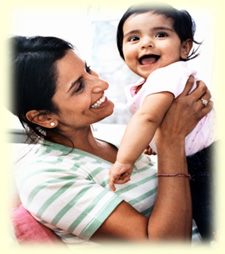

About the Thrive Trial
THRIVE stands for the Trial of Healthy Relationship Initiatives for the Very Early-years.
The study has been designed to investigate the effectiveness of two parenting support programmes called Mellow Bumps and Enhanced Triple P for Baby compared with the current treatment being provided by the NHS for women with additional health and social care needs in pregnancy.
There are a number of parenting support groups that are designed to improve the wellbeing of mothers with additional needs in pregnancy and their babies. This study aims to investigate if this group benefit from taking part in either of the parenting support programmes Enhanced Triple P for Baby or Mellow Bumps. We would like to investigate if these parenting support programmes improve mothers’ wellbeing and the relationship between them and their babies and if they are more beneficial to them than the current treatment offered by their regular care team. We are also interested in finding out if one approach is more beneficial to mothers than the other and if improvements carry on over time. This kind of research may help health practitioners to offer the right kind of help to give mothers and their babies the best start in life.
Who takes part in the study?
Pregnant women from the NHS Greater Glasgow and Clyde and NHS Ayrshire and Arran health boards who have been identified as having additional health and social care needs in their pregnancy. This will include those who have experienced mental health difficulties, domestic abuse, addiction or have been in care.
Aims of the study?
The overarching aim of the research is to rigorously evaluate whether parenting programmes delivered in pregnancy, in this case Enhanced Triple P for Baby and Mellow Bumps, can reduce mother's anxiety, depression and irritability and improve outcomes for children. In particular, the study will aim to determine if either of these interventions offer improvements over, or are more cost-effective than, the routine treatment provided to mothers with additional health and social care needs in pregnancy.
Mother
• Reduction of stress and anxiety in pregnancy.
• Promotion of a strong positive bond between the mother and baby.
Child
• Promotion of co-operative behaviour.
• Improved language development at age 30 months.
• Reduction in the number of children flagged as ‘at risk’ on the social services risk register or under a child protection plan, taken into care or attending accident and emergency.
• Improvements in longer-term outcomes such as socio-emotional and language development at 30 months and educational outcomes in the early years.
What are the interventions?
Enhanced Triple P for Baby
Enhanced Triple P for Baby is informed by social learning theory and is designed to address the needs of women who have additional health and social care needs in pregnancy. It comprises of four 2 hour antenatal group session and four postnatal sessions; three of which last 1 hour and are delivered on a one-to-one basis and one which lasts two hours and can be delivered either individually or in a group. The intervention lasts approximately 13 hours. Enhanced Triple P for Baby’s emphasis is on families and includes fathers. It has very practical skills-based content around expectations of, and coping with, the new challenges of parenthood whilst maintaining a happy family.
Mellow Bumps
Mellow Bumps is underpinned by attachment theory and designed to support mothers who have special needs in pregnancy. It involves seven 2 hour antenatal group sessions and one 2 hour postnatal group session and focuses on mothers, although fathers are invited to one session. The content focuses on nurturing mothers’ self-care, providing mothers with guided reflection, encouraging nurturing of the foetus/baby, engagement with the foetus/baby and synchrony in the mother-foetus/infant relationship.
Link to programme websites
http://www.mellowparenting.org/
http://www.triplep.net/
How the study works
Women identified as having additional health and social care needs in pregnancy will be approached to take part in the trial after they have reached 12 weeks gestation. On agreement to be entered into the trial each woman will be asked to complete a baseline questionnaire which will measure their demographic information, in particular; their family dynamics and deprivation indicators. The questionnaire will also include measures of psychological distress, health status, anxiety and depression.
The women will then be randomly allocated to the following parenting programmes by block randomisation:
• Mellow Bumps
• Enhanced Triple P for Baby
• Care as Usual provided by regular care team.
The groups are designed to be delivered to woman between 20–30 weeks gestation. As part of the process evaluation women will be asked to complete an evaluation questionnaire for each session they attend.
For the next stage of the study the women will be contacted when their baby is six months old. They will again be asked to complete a questionnaire which will reassess the information gathered during the baseline questionnaire. The mothers will be asked to complete additional questions to rate their own views on their parenting skills. Consent will be sought to video a short (15 minute) interaction between the mother and her child which will be used to examine the relationship between them. This evidence will be used as the key indicator for this section of the study.
What is being measured?
The study will measure the severity of any psychological distress, anxiety and depression, and the health status of the pregnant women through the questions asked at baseline. In addition questions will be asked at the follow-up visit (when the baby is over 6 months old) to measure parenting self-efficacy and the quality of the mother-child interaction.
Ethical approval
This study has been reviewed and approved by the West of Scotland NHS Research Ethics Committee (3).
Sponsor
This study is sponsored by NHS Greater Glasgow & Clyde.
Funders
This project is funded by the National Institute for Health Research Public Health Research (NIHR PHR) Programme (project number 11/3002/01) and the Chief Scientist Office (Scotland).
The views and opinions expressed therein are those of the authors and do not necessarily reflect those of the NIHR PHR Programme or the Department of Health.
Staff
The research is led by Dr. Marion Henderson, and involves researchers based at the University of Glasgow, Glasgow Caledonian University, the University of Aberdeen, the University of Manchester and the University of Newcastle.
You can contact the THRIVE team by telephone on 0800 389 2129 or by emailing sphsu-thrive@glasgow.ac.uk or thrive@sphsu.mrc.ac.uk.
